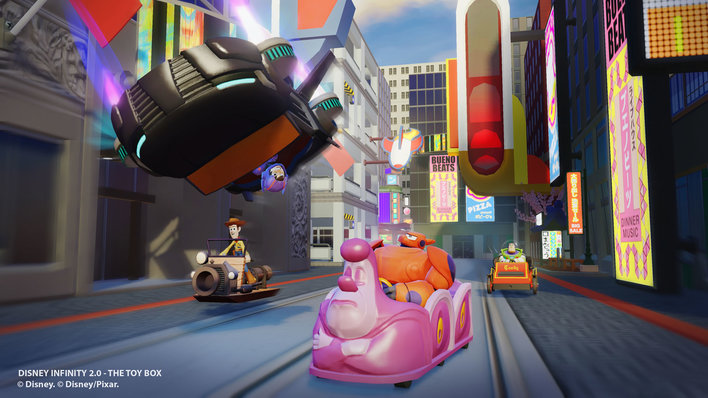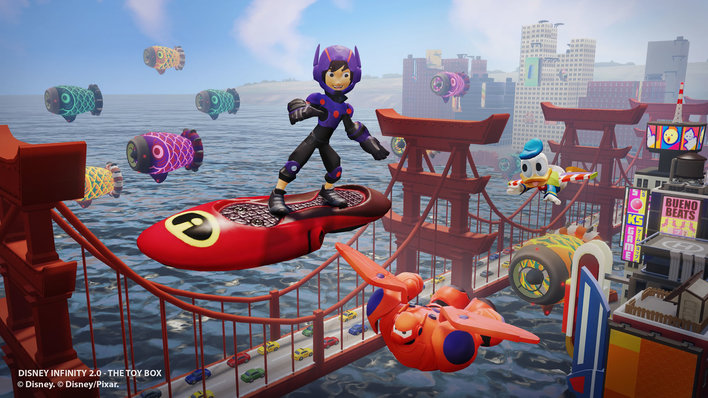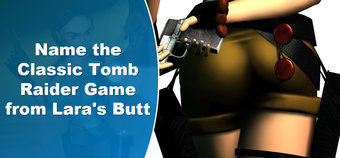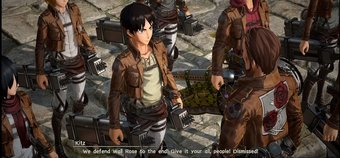Disney Infinity was a game that had high hopes, but ended up falling a little bit short of the mark. Divided up into two distinct chunks, the game was made up of the Play Sets, which offered a traditional story driven co-op adventure, and a more ambitious mode known as the Toy Box. Mixing the toy-buying fun of Skylanders with the world creation of something like Minecraft, Disney Infinity's Toy Box mode was intended as a blank canvas for the most creative of players - and, as it turned out, pretty much only them. Tricky to get in to, and with controls that were fiddly to say the least, creating your own levels for the game was anything but simple - but that's something Toy Box 2.0, the upgraded world-builder featured in Disney Infinity 2.0, is hoping to put right (for a primer on the game, check out Disney Infinity 2.0 Marvel Superheroes: What it is, and everything we know).
At the recent German games show, gamescom, we got to go hands-on with Disney Infinity 2.0's Toy Box mode, under the watchful eyes of the always enthusiastic series producer John Day - a man who can sell anyone on the Disney Infinity concept within a few minutes of meeting them. When we first entered the room, he was playing around in the Toy Box with a Main Street Electrical Parade float - a new toy for the game snatched straight from the Disneyland parks - only this time, it's ridable. It's just one of hundreds of new toys, objects, and components you can build into your world, using the game's much simpler editor.
Essentially giving you the freedom to create your own stages, the basic concept behind the Toy Box remains the same - you're presented with an empty level game world that you can add to, delete, shuffle around and build in for yourself, to create stages, worlds, and stories you can share with your friends. The only difference is, this time you don't actually have to do anything yourself.

"Everything you see before you...." can be auto generated?
"I'll be honest with you, I'm not actually that much of a builder, I'm just not. I love the idea, I think it's cool, but I don't have time to spend time on it.". John explains. That may explain why the game's newest toys - builders - aim to make the construction of your level that much quicker. When you're faced with an empty space, and decide a castle would look nice there instead, you may not want to spend time slogging through the game's various menus, finding the right pieces, and slowly slotting them together. Builders, as their name suggests, can take care of all that for you. Coming in a variety of flavours, these little AI figures will stroll around your game world, building *things* as you've instructed. All you have to do is drag a selection box to show how big you want it, how tall you want it, and where you want it to go, and your builders will do the hard work for you. And they can be as generic or as specific as you want. From forest builders to grind rail builders, from castle builders to pirate village builders, there's a builder for most things you can think of - and the things they make will look totally different every time. Procedurally generated, you can give two builders two equal areas of space to work in, and both will make something completely different.
Of course, they aren't entirely perfect, as John demonstrates, setting Mr Gibbs to build a pirate village, only for him to start constructing it off a cliff. "Mr Gibbs is just building something off in space - they don't always respect the laws of physics" he explains - but even if it isn't perfect, building your ideal level will take a fraction of the time. If you want to concentrate on the puzzles in your level, you can leave a builder making the scenery. If you want to build yourself a grand forest, but don't care too much about the seaside shanty town it leads to, you can divide the work up as you see fit. And the builders can handle gameplay, too.

Builders hard at work.
With mild trepidation, we watched as John found out a "platform" builder from his virtual toy box, and dragged out an area in the game world, before letting the builder get to work. It's hard enough for a human to get gameplay elements right - but could a computer really manage any better? Still, John wasn't worried, as we headed back down to the ground to tweak his newly (auto-) constructed pirate village. "Bear in mind that I have all the individual pieces of the toy box to build with myself, and I can modify any of them too. I can whip out my magic wand, grab pieces of this castle, and I can delete them, or move them, and edit and modify." So if you suddenly decide you do care how that forest looks, or think poor old Mr Gibbs was a berk for putting the pub right next to a little old lady's house, you can delve in, and tweak their creations too.
After a few minutes had passed (the builders don't finish things instantly, and take things pretty steadily), it was time to see how the platform builder was getting on. Having half expected them to build a straight road with a single jump in the middle, you can imagine our amazement when we were met with a fully functioning, and rather complex looking, platforming stage. With automatically raising platforms, beams that swung by to knock you off, conveyor belts, traps, and practically every other type of platforming staple you can think of, this was a fully fledged game - and all made automatically by a computer.

Platforming Fury
Of course, you can delve in and get hands-on if you prefer it that way too. If you never want to touch the builders, you don't have to, as everything they construct is available to you in your Toy Box - and there's been a few big improvements here, too. Perhaps the biggest is that of magnetism, or the ability to snap objects to the ground, or other buildings. Before, building a race track, or even placing a building was a lot harder than it needed to be, as everything would look perfect and lined up, until you set foot in your game world, where you'd find your perfect castle was hovering two feet off the ground, and your race track pieces weren't quite together, giving you a nasty bit of whiplash after you rounded the first corner. Now, this isn't a problem, as pieces can "snap" to each other to ensure they're all connected properly.
But that's arguably one of the smallest improvements. For 2.0, Disney have gone all out to make the creator much, much more powerful than before, no matter what you intend to use it for.
One of the most impressive new features are interiors, which almost do what they say on the tin. New for Toy Box 2.0, you can now use doors to not only link two (or more) Toy Box worlds together - but can take you inside the castles and forts you build. "Doors do not respect the laws of physics, so you can have doors connect to another outside area or inside area, and you can build whatever you want in either place." With a more compact, more crowded feel, these interiors can be every bit as varied as the other worlds you make - with plenty of customisation to boot.

Much more compact, but with loads of possibilities
"The interiors themselves represent a different way of building. Instead of building a big spacious world where I can build castles, these are more like the inside of a base, or a house, or a castle." Much in the same way as the Toy Box, you can choose the rooms you want, choose how big you want them, and link them together either directly through doors, or using corridors to bridge the gaps. Once placed, you can go as nuts as you want, changing the wallpapers (John showed us wallpapers based on Aladdin, Andy's Room, and even the Enchanted Tiki Room), altering the themes, and filling your hideaway full of cool stuff.
As you go through the game, you'll also unlock various bits and pieces for completing the game's countless goals. If you're that way inclined, and a bit narcissistic, the interiors offer a great way for showing off your wares, letting you create your own, glamorous base to serve as a home for your newly unlocked loot. The people you create in your interiors will treat it as though it were their own, too, making themselves comfortable in Gaston's chair, watching your TVs, and even flicking your lights on and off. With over 200 decorations - some of which are unlocked from the start, and some you'll have to earn - there's plenty of room to put your personal touch on interiors - and they offer plenty of gameplay opportunities too.
Perhaps most importantly, interiors let you make much more impressive levels, or even games of different types. You could create a role playing game with buildings to enter, people to talk to (seeing as you can add pop-up text boxes now too), and quests to complete. You could make a huge maze, with several "floors" of challenge to complete. Or, if you're like us, you're probably already dreaming about making your own Space Mountain themed stage. But is that a realistic possibility?

You can put your personal touch on your base.
"Theoretically, yes. I can have Space Mountain, I can have a door, I can go in to the door which takes me into a new Toy Box where there's a big rail slide that looks like Space Mountain. [In fact], if you're a fan of the parks, let me tell you, you will not be disappointed. We've got all sorts of vehicles and toys from the parks, and lots of nice little hints here and there." And as if to prove a point, John went back to the interior, and switched the wallpaper to one based on It's a Small World. Now all we need is that tune playing.
So, now we know the first thing we'll be doing when we get the game is trying to see if we can make our own take on Space Mountain - but is there any room for an official take on Disneyland within Disney Infinity? Say, an official Play Set where all your characters would work, and you could explore a virtual recreation of Disneyland, with quests to complete, mini-games based on rides, and all the "Disney magic" packaged in a translucent plastic container? Kind of like Kinect Disneyland, but without the risk of deep vein thrombosis in your arms. The official answer?
"Not yet - although..." Although?? At that point, we noticed a slight smile, and pushed that little bit further. With a laugh, John switched back into corporate mode, and regurgitated the statement the PRs had presumably briefed him to say before he left for Germany: "Disney Infinity's an on-going platform, and we reserve the right to deliver new content, but we haven't announced anything yet!" That's a yes then. You heard it here first - Disney Infinity: Disneyland Edition, coming soon.
If we're honest though, from our hours of experimentation on the first game, one of the hardest things making something that looked truly original. You could choose from plenty of pre-made buildings, but when it came to making your own, or carving your own scenery, you didn't really have that much to play with in terms of primitive shapes, and how you could decorate them. Straddling the gap between a totally free-form creator like Minecraft, and a traditional sort of level editor, it's a balance the team at Disney spend a long time getting right "I think we're somewhere in between [Minecraft and where we were last time]. We have very primitive blocks, and we also have individual pieces of buildings - we have water towers, air conditioning units [and the like], so if people want to, they can put buildings together for themselves. We've added more pieces of terrain, and we've expanded dramatically the choice of pieces available. What we have to keep in mind is that the audience we're aiming for tends to skew pretty young, and we try to make everything accessible for them as well."

Donald Duck in a Jet Pack - only in Disney Infinity 2.0
One of the other areas that's been majorly expanded for 2.0 is the Toy Box's range of tools for making your own games - by which we mean a different style of mini-game, rather than your own Disney Infinity level. "One of the problems we had in the first game is, I could build a big maze, I could fill it full of puzzles and bad guys and stuff, but there was nothing to stop me just showing up and pulling out a magic wand and deleting it all. You didn't have to play it the way I meant for you to play it". Now, they've added a tool called the Game Maker, which lets you control exactly what people can (or can't) do in your levels - you can turn on or off parts of the user interface, and make it so players can't edit logic, delete toys, move toys, or use power discs, amongst other things. It gives you that extra bit of control over your levels - and ensures no one can cheat their way to the end.
And the stages you make will look better, too. While previously, monster spawners were giant, barbed wire covered monstrosities that made it totally obvious what was about to happen, now, they have a tool called a locator, which lets you set a separate spawn point where the enemies you create will actually appear. That lets you not only hide the actual spawner around a corner - but even outside the walls of an interior level itself, meaning players will have no idea what's coming.
Another incredibly cool new feature is the remote controller. This cool little toy actually allows you to reprogram a player's controller - and you can imagine how many uses that's going to have. Whether you're inverting a player's controls upon them entering a certain room, turning them into a dungeon master by giving them control over doors and monster spawning points, or even, as John suggests, making a pinball style level by giving them control over flippers, this opens Disney Infinity to a whole host of different game types.

Wack wack wack waaackkkk
But the proof, of course, will be in the pudding - or rather, in the consuming it. Games that come with level editors like the Toy Box mode are always great to delve in to - but as John himself points out, it can all be rather time consuming for those of us who don't really know what we're doing. Luckily, thanks to the wonders of the internet, there's always someone out there who's a) much more talented than you, and b) has a lot more free time than you do - and Disney Infinity 2.0 makes it easier than ever to sample the best of their work.
"On Disney Infinity 2, sharing's better. On Disney ID, which is like our gaming social network, I can share my creations with my Disney ID friends, without going through Disney first."
It's an impressive feature, and, better yet, one that's platform independent, letting you share worlds and stages between copies of Disney Infinity 2.0, no matter which console you're playing on, or which console it was made on. Better yet, it's cross gen too, so a PS3 player can download a level made on a PS4, or an Xbox One, with few restrictions. "There is a point where I will have made a toy box too large for that platform, and it won't let me do it (because you can make stages in the next gen versions that are a lot bigger than in the current gen), but otherwise, it's totally OK"
Of course, Disney Infinity 2.0 is much more than just the Toy Box mode. There are story driven Play Sets to delve in to too - and they raised a few issues of their own. One of the biggest disappointments with the original Disney Infinity was the restrictions placed on the characters. While one Skylander could take you through every level of Skylanders: Swap Force, in Disney Infinity, characters were restricted to "worlds". Anyone could play with anyone in the Toy Box, but in the more story-driven Play Sets, you had to play as a character from that "franchise", meaning Sully couldn't put on an eye patch and take over a ship in Pirates of the Caribbean, and Mike couldn't stretch himself into some spandex to become an Incredible. Which was probably for the best, as even spandex has its limits.

Only in the Toy Box mode
Either way, the inability to take your newly bought figures wherever you go was one of the biggest disappointments with Disney Infinity - and it was something we quizzed John about too. Why were there so many restrictions in place? "There's a certain amount of sacredness to a character's universe... There are important technical reasons too - a [good] example is how do you account for all the different play styles and different mechanics, and have them work in every single play set? That becomes technically very challenging. But there's all sorts of intellectual property preservation. If I'm in the world of the Avengers, I'm not just playing with the Avengers characters - it needs to stay true to that world. If I'm in Cars, the Incredible Hulk does not belong in the world of Cars"
Yeah, but it'd be cool if he could?
"OK, I agree, it would be cool."
Having sensed a flicker, we pushed a little bit further, and asked why these same intellectual property issues don't occur in the Toy Box. "The premise for the worlds is that you're in those worlds. The premise for the Toy Box is that you're on some kid's bedroom floor. And when kids play together on a bedroom floor, they don't care what character someone is, they'll play with them all together, and they'll make up their own stories..."
Of course, you could argue that the Avengers play set is also on a bedroom floor, with Donald Duck as the seventh Avenger, right?
"All of this is perfectly true, and to be perfectly honest, this is the side of the argument I'm on. I agree with you. But this is how we kept everybody happy. I imagine you can appreciate the licensing and approvals palooza it was to get deal with something with this many different properties in it, and get everyone to agree to it. I was, personally, in charge of all the approvals for the content in the Toy Box on Disney Infinity 2.0." And that must have been a lot of headaches, right? With a bit of a wince and a laugh, John replied "It wasn't as bad as I maybe implied, but ultimately we found ways to make it work!"
And make it work they have. If what we saw on the day is anything to go by, Disney Infinity 2.0 is packed full of so many things to do, you'll wonder how they managed to fit it all on the disc. The Avengers Play Set that comes with the game may only be one game world, but it's six times larger than the previous games, and will take 5-6 hours to play through. That may not sound like much - but that's not including time spent finding all the collectibles, and completing all of the side quests. And that's another thing that's been ramped up for Disney Infinity 2.0, according to John.
"We've got Feats, in both Play Sets and the Toy Box, which are almost like micro achievements that give you concept art, sparks, and new toys for the Toy Box. We've got 250 of those... In fact, our challenge designer stated to me "I've made it my personal mission to make it the hardest thing in the entire game to get gold medals on all the challenges." If someone's dedicated to that, they're going to spend a lot of time unlocking them all."
And spend a lot of time we will. While the original Disney Infinity may have left a lot to be desired in places, Disney Infinity 2.0 looks set to put right everything the original got wrong. With the Toy Box redesigned, sharing made so much easier, interiors presenting all sorts of different possibilities, and some pretty advanced ways of crafting your own games, this is going to give creative Disney fans a lot to keep them busy in just a few weeks time. Check back soon for our full review.
















